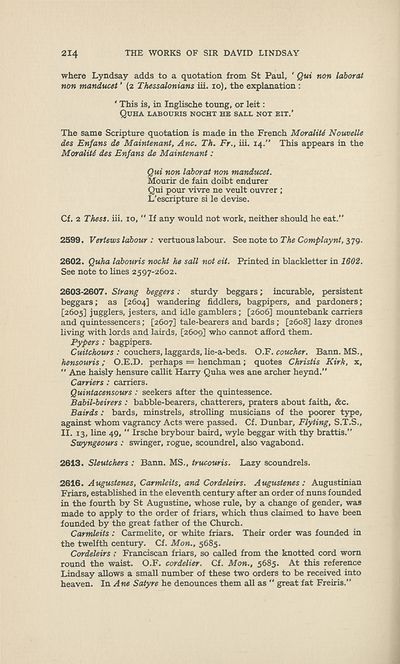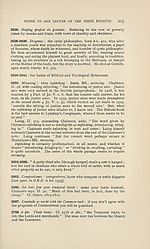Scottish Text Society publications > Third series > Works of Sir David Lindsay of the Mount, 1490-1555 > Volume 4, 1936
(282)
Download files
Complete book:
Individual page:
Thumbnail gallery: Grid view | List view

214
THE WORKS OF SIR DAVID LINDSAY
where Lyndsay adds to a quotation from St Paul, ' Qui non laborat
non manducet ’ (2 Thessalonians iii. 10), the explanation :
' This is, in Inglische toung, or leit :
Quha labouris nocht he sale not bit.’
The same Scripture quotation is made in the French MoraliU Nouvelle
des Enfans de Maintenant, Anc. Th. Fr., iii. 14.” This appears in the
MoraliU des Enfans de Maintenant:
Qui non laborat non manducet.
Mourir de fain doibt endurer
Qui pour vivre ne veult ouvrer ;
L’escripture si le devise.
Cf. 2 Thess. iii. 10, " If any would not work, neither should he eat."
2599. Vertews labour : vertuouslcLbour. See note to The Complaynt, 379.
2602. Quha labouris nocht he sail not eit. Printed in blackletter in 1602.
See note to lines 2597-2602.
2603-2607. Strang beggers: sturdy beggars; incurable, persistent
beggars; as [2604] wandering fiddlers, bagpipers, and pardoners;
[2605] jugglers, jesters, and idle gamblers; [2606] mountebank carriers
and quintessencers; [2607] tale-bearers and bards; [2608] lazy drones
living with lords and lairds, [2609] who cannot afford them.
Pypers : bagpipers.
Cuitchours : couchers, laggards, lie-a-beds. O.F. coucher. Bann. MS.,
hensouris; O.E.D. perhaps == henchman; quotes Christis Kirk, x,
" Ane haisly hensure callit Harry Quha wes ane archer heynd."
Carriers : carriers.
Quintacensours : seekers after the quintessence.
Babil-beirers : babble-bearers, chatterers, praters about faith, &c.
Bairds : bards, minstrels, strolling musicians of the poorer type,
against whom vagrancy Acts were passed. Cf. Dunbar, Flyting, S.T.S.,
II. 13, line 49, " Irsche brybour baird, wyle beggar with thy brattis.”
Swyngeours : swinger, rogue, scoundrel, also vagabond.
2613. Sleutchers : Bann. MS., trucouris. Lazy scoundrels.
2616. Auguslenes, Carmleits, and Cordeleirs. Augustenes : Augustinian
Friars, established in the eleventh century after an order of nuns founded
in the fourth by St Augustine, whose rule, by a change of gender, was
made to apply to the order of friars, which thus claimed to have been
founded by the great father of the Church.
Carmleits : Carmelite, or white friars. Their order was founded in
the twelfth century. Cf. Mon., 5685.
Cordeleirs ; Franciscan friars, so called from the knotted cord worn
round the waist. O.F. cordelier. Cf. Mon., 5685. At this reference
Lindsay allows a small number of these two orders to be received into
heaven. In Ane Satyre he denounces them all as " great fat Freiris."
THE WORKS OF SIR DAVID LINDSAY
where Lyndsay adds to a quotation from St Paul, ' Qui non laborat
non manducet ’ (2 Thessalonians iii. 10), the explanation :
' This is, in Inglische toung, or leit :
Quha labouris nocht he sale not bit.’
The same Scripture quotation is made in the French MoraliU Nouvelle
des Enfans de Maintenant, Anc. Th. Fr., iii. 14.” This appears in the
MoraliU des Enfans de Maintenant:
Qui non laborat non manducet.
Mourir de fain doibt endurer
Qui pour vivre ne veult ouvrer ;
L’escripture si le devise.
Cf. 2 Thess. iii. 10, " If any would not work, neither should he eat."
2599. Vertews labour : vertuouslcLbour. See note to The Complaynt, 379.
2602. Quha labouris nocht he sail not eit. Printed in blackletter in 1602.
See note to lines 2597-2602.
2603-2607. Strang beggers: sturdy beggars; incurable, persistent
beggars; as [2604] wandering fiddlers, bagpipers, and pardoners;
[2605] jugglers, jesters, and idle gamblers; [2606] mountebank carriers
and quintessencers; [2607] tale-bearers and bards; [2608] lazy drones
living with lords and lairds, [2609] who cannot afford them.
Pypers : bagpipers.
Cuitchours : couchers, laggards, lie-a-beds. O.F. coucher. Bann. MS.,
hensouris; O.E.D. perhaps == henchman; quotes Christis Kirk, x,
" Ane haisly hensure callit Harry Quha wes ane archer heynd."
Carriers : carriers.
Quintacensours : seekers after the quintessence.
Babil-beirers : babble-bearers, chatterers, praters about faith, &c.
Bairds : bards, minstrels, strolling musicians of the poorer type,
against whom vagrancy Acts were passed. Cf. Dunbar, Flyting, S.T.S.,
II. 13, line 49, " Irsche brybour baird, wyle beggar with thy brattis.”
Swyngeours : swinger, rogue, scoundrel, also vagabond.
2613. Sleutchers : Bann. MS., trucouris. Lazy scoundrels.
2616. Auguslenes, Carmleits, and Cordeleirs. Augustenes : Augustinian
Friars, established in the eleventh century after an order of nuns founded
in the fourth by St Augustine, whose rule, by a change of gender, was
made to apply to the order of friars, which thus claimed to have been
founded by the great father of the Church.
Carmleits : Carmelite, or white friars. Their order was founded in
the twelfth century. Cf. Mon., 5685.
Cordeleirs ; Franciscan friars, so called from the knotted cord worn
round the waist. O.F. cordelier. Cf. Mon., 5685. At this reference
Lindsay allows a small number of these two orders to be received into
heaven. In Ane Satyre he denounces them all as " great fat Freiris."
Set display mode to: Large image | Zoom image | Transcription
Images and transcriptions on this page, including medium image downloads, may be used under the Creative Commons Attribution 4.0 International Licence unless otherwise stated. ![]()
| Publications by Scottish clubs > Scottish Text Society publications > Third series > Works of Sir David Lindsay of the Mount, 1490-1555 > Volume 4, 1936 > (282) |
|---|
| Permanent URL | https://digital.nls.uk/107278259 |
|---|
| Shelfmark | SCS.STES3.8 |
|---|---|
| Attribution and copyright: |
|
| Description | A collection of over 100 Scottish texts dating from around 1400 to 1700. Most titles are in Scots, and include editions of poetry, drama, and prose by major Scottish writers such as John Barbour, William Dunbar, Gavin Douglas, and George Buchanan. Edited by a key scholarly publisher of Scotland's literary history, and published from the late 19th century onwards by the Scottish Text Society. Available here are STS series 1-3. |
|---|

